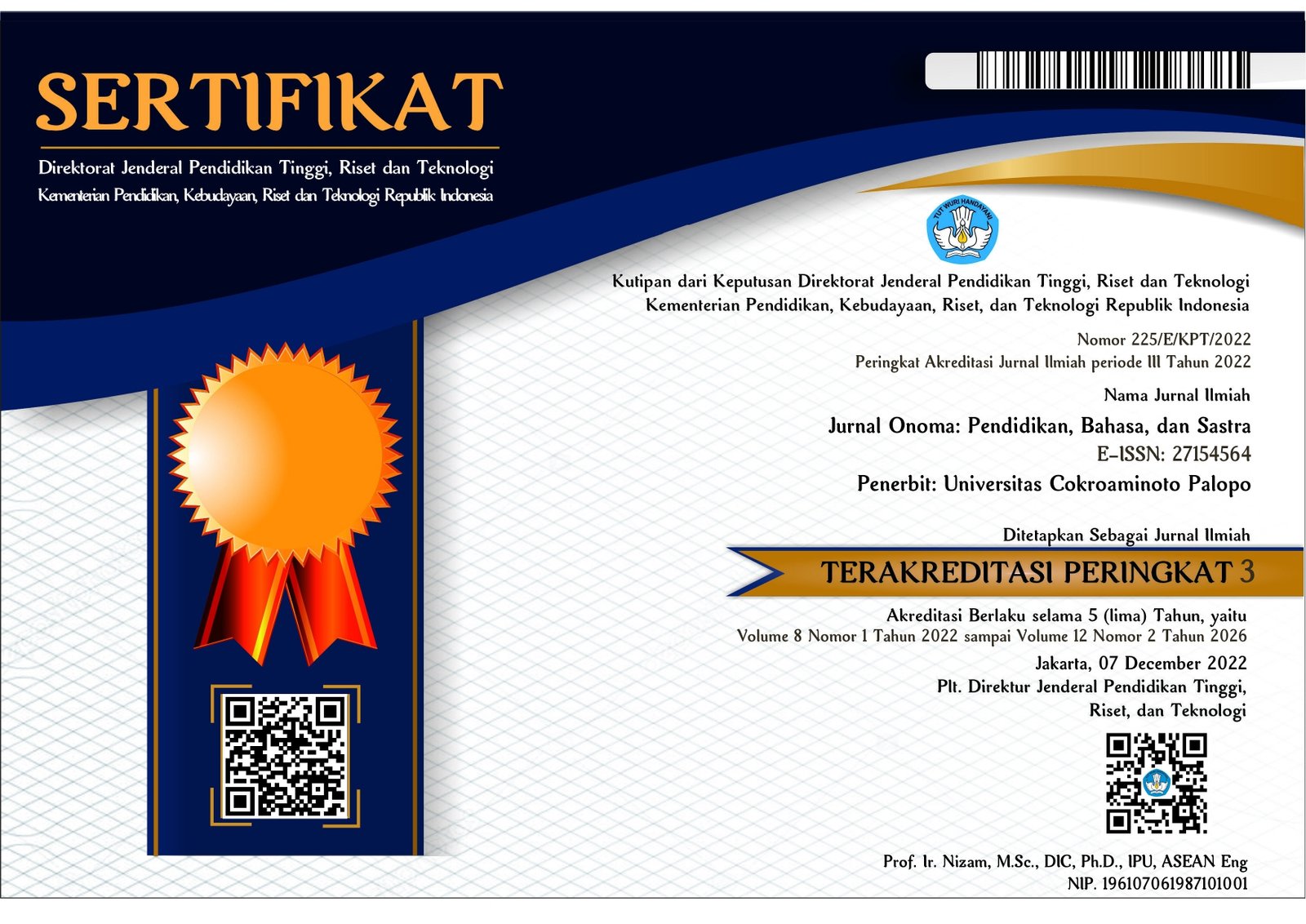Feminist Standpont Theory Melalui Tokoh Firdaus dalam Novel Perempuan di Titik Nol Karya Nawal El Saadawi
https://doi.org/10.30605/onoma.v10i4.4607
Keywords:
perempuan, ketidakadilan gender, feminist standpoint theoryAbstract
Penelitian ini membuka perspektif sudut pandang mengenai ketidakdilan yang dihadapi oleh Firdaus sebagai wanita yang hidup dalam konstruksi sosial patriarkal. Perempuan dikenal sebagai the second sex yang menempati posisi lebih rendah daripada laki-laki. Firdaus pada Perempuan di Titik Nol yang ditulis oleh Nawal El Saadawi mendapati ketidadilan gender yang menempatkan dirinya sebagai perempuan tertindas yang mengalami kekerasan dan pelecehan seksual yang dilakukan laki-laki di sekitarnya. Penelitian ini menggunakan pendekatan feminisme dengan feminist standpoint theory yang menghasilkan tiga konsep utama yaitu 1) stanpoint (sudut pandang) Firdaus sebagai wanita dalam masyarakat patriarki bahwa hanya laki-laki yang pantas mendapatkan pendidan karena perempuan disapkan untuk bekerja di ranah domestik 2) Situated Knowledge (pengetahuan tersituasi) Firdaus tentang pernikahan yang melegalkan suami melakukan kekerasa pada istri 3) Sexual division of labor (pekerjaan dibagi berdasarkan jenis kelamin) menempatkan Firdaus untuk melakukan semua pekerjaan rumah tangga karena laki-laki tidak diperkenankan untuk menyentuh pekerjaan domestik. Melalui penelitian ini dapat disimpulkan bahwa melalui sudut pandang Firdaus, perempuan memiliki kedudukan lebih rendah daripada laki-laki dan pernikahan dalam sudut pandang Firdaus merupakan bentuk penindasan paling kejam bagi wanita.
Downloads
References
Djamereng, J., & Nuraeni. (2020). Feminisme Dalam Novel “Perempuan Di Titik Nol” (Tinjauan Analisis Feminis Sosialis). Sipakalebbi , 4(2), 409–424. DOI: https://doi.org/10.24252/jsipakallebbi.v4i2.18551
Fakih, M. (2013). Analisis Gender dan Transformasi Sosial. Pustaka Pelajar.
Harding, S. (1993). Whose Science? Whose Knowledge? Thinking from Women’s Lives. Cornell University Press.
Harding, S. (2004). The Feminist Standpoint Theory Reader Intellectual and Political Controversies. Routledge.
Hengehold, L. (2017). Simone De Beauvoir’s Philosophy of Individuation . Edinburgh University Press. DOI: https://doi.org/10.3366/edinburgh/9781474418874.001.0001
Heriyanti, L., Sa’adah, N., & Andreyanto, N. (2020). Membaca Perempuan Di Titik Nol: Perspektif Feminisme Eksistensialis. Jurnal Wanita Dan Keluarga, 1(2), 31–39. https://doi.org/10.22146/jwk.1027 DOI: https://doi.org/10.22146/jwk.1027
Littlejohn, S. W., Foss, K. A., & Oetzel, J. G. (2017). Theories of Human Communication. Waveland Press.
Nugroho, A., Suseno, S., & Prabaningrum, D. (2021). The The Feminism Perspective in the “Si Parasit Lajang” Novel by Ayu Utami: A Feminist Standpoint Theory Nancy C. M. Hartsock Studies. Jurnal Sastra Indonesia, 10(2), 133–141. https://doi.org/10.15294/jsi.v10i2.48329 DOI: https://doi.org/10.15294/jsi.v10i2.48329
PUTUSAN PA SEMARANG 2114/PDT.G/2023/PA.SMG. (2023, December). Direktori Putusan Mahkamah Agung Republik Indonesia. Direktori Putusan (mahkamahagung.go.id) / Diakses pada 28 Januari 2023
Saadawi, N. El. (2014). Perempuan di Titik Nol. Yayasan Pustaka Obor Indonesia.
Suharto, S. (2015). Kritik Sastra Feminis Teori dan Aplikasinya. Pustaka Pelajar.
Yusuf, M. (2014). Metode Penelitian Kuantitatif, Kualitatif, dan Penelitian Gabungan. PT Fajar Interpratama Mandiri.
Downloads
Published
How to Cite
License
In submitting the manuscript to the journal, the authors certify that:
- They are authorized by their co-authors to enter into these arrangements.
- The work described has not been formally published before, except in the form of an abstract or as part of a published lecture, review, thesis, or overlay journal.
- That it is not under consideration for publication elsewhere,
- That its publication has been approved by all the author(s) and by the responsible authorities – tacitly or explicitly – of the institutes where the work has been carried out.
- They secure the right to reproduce any material that has already been published or copyrighted elsewhere.
- They agree to the following license and copyright agreement.
License and Copyright Agreement
Authors who publish with Onoma Journal: Education, Languages??, and Literature agree to the following terms:
- Authors retain copyright and grant the journal right of first publication with the work simultaneously licensed under Creative Commons Attribution License (CC BY 4.0) that allows others to share the work with an acknowledgment of the work's authorship and initial publication in this journal.
- Authors are able to enter into separate, additional contractual arrangements for the non-exclusive distribution of the journal's published version of the work (e.g., post it to an institutional repository or publish it in a book), with an acknowledgment of its initial publication in this journal.
- Authors are permitted and encouraged to post their work online (e.g., in institutional repositories or on their website) prior to and during the submission process, as it can lead to productive exchanges, as well as earlier and greater citation of published work.

















